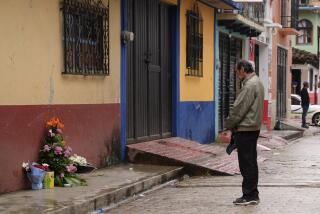In Mexico, Pope Benedict decries ‘evil’ behind drug violence
Reporting from Leon, Mexico — Pope Benedict XVI traveled to Mexico on Friday, urging this nation’s Catholics to resist the temptations of violent drug traffickers and calling for change in Cuba.
This is Benedict’s first voyage to the Spanish-speaking Americas; after three days in Mexico, he continues to Cuba, the first papal visit to the island nation since John Paul II’s historic trip to Havana in 1998.
Landing on a sun-drenched afternoon in Mexico’s conservative and traditionally Catholic midsection, Benedict was greeted by President Felipe Calderon.
Adding to the festivities were a mariachi band and thousands of mostly youthful pilgrims, as well as entire families, from various Mexican states and as far away as California, who lined the 20-mile stretch that the “pope mobile” traveled to carry the pontiff into the heart of this city.
Calderon, who has been accused in this bitter election year of using the papal visit to bolster his pro-Catholic political party, thanked Benedict for his “gesture of solidarity and fraternity.”
Speaking on the Alitalia jet that brought him to Mexico, Benedict condemned the “evil” behind drug war violence that has claimed tens of thousands of lives in the country in recent years. And he said the church, often criticized for its complacency, has a duty to steer Mexicans from the “idolatry of money” that fuels the drug business.
“It is the responsibility of the church to educate consciences, to teach moral responsibility and to unmask the evil,” he said, “to unmask this idolatry of money that enslaves man, to unmask the false promises, the lies, the fraud that is behind drugs.”
Later, at the airport welcoming ceremony, he added: “I will pray especially for those who most need it, particularly for those who suffer because of old and new rivalries, resentments and all forms of violence.”
Benedict has come to Guanajuato state, which has escaped the worst of the violence plaguing much of the country. But, in a sign of the omnipresence of drug cartels, nearly a dozen banners were hung in the area before his arrival pledging to keep the peace during the pope’s visit.
Many cartel leaders profess Christian faith and, over the years, have given money to their local parishes, further complicating the relationship between the church and cartels.
“His message is one of peace, for all the Mexican people,” said Azai Crespo, a 17-year-old from a Catholic youth group, who was canoodling with his girlfriend among the crowds lining the papal motorcade route. “He is saying, ‘Don’t take the easy way out, that leads to violence.’”
Benedict also had pointed words for the Cuban government, which has recently promoted serious economic change but continues to repress political dissent.
On Monday, Benedict travels to Santiago de Cuba and Havana. Asked by a reporter on the flight from Rome about his visit to Cuba, he said the communist nation had to find “new models.”
“Today it is evident that Marxist ideology, in the way it was conceived, no longer corresponds to reality,” he said. “In this way, we can no longer respond and build a society. New models must be found with patience and in a constructive way.”
Also Friday, the New York-based Human Rights Watch called for the Cuban government to end “repression aimed at silencing dissent” ahead of and during the pope’s visit.
Dissidents, whom the Cuban government views as subversives, have been beaten, briefly arrested and otherwise harassed in recent days in eight cities, human rights activists say.
Eighty members of the Damas de Blanco (Ladies in White), a group of relatives of Cuban political prisoners that stages protest marches every week after Mass, were briefly detained over the weekend and warned not to try to attend papal events, activists said.
Here in Leon, in heavily Catholic Guanajuato state where women accused of having had abortions have been jailed, enthusiasm for the pope’s visit has built slowly. Vast campgrounds set up for pilgrims remained virtually empty as late as Thursday night.
In neighboring Guanajuato city, where Benedict meets formally with Calderon on Saturday, residents were spiffing up the place but seemed dismayed over the lack of visitors.
“It’s the economy,” said Angel Espinoza, who sells hand-painted pottery. “This has been talked about a lot, but we are pretty alone.”
The pace of arriving pilgrims picked up substantially Friday. Many of those arriving in Leon on Friday had traveled over land for hours.
“Many people made the sacrifice,” said Jesus Reyes, who drove a bus with 48 people for 26 hours (with bathroom stops) from Ciudad Juarez, Mexico’s most violent city, on the border with El Paso.
Also lining the motorcade route, craning for a view of Benedict, was a group of Tarahumara Indian women from drought-ravaged Chihuahua state, where people are dying of hunger.
“We are here for the many in our villages who could not come,” said Sister San Juana Oliva, 38, adding that she hoped the pope would hear her community’s prayers for food and rain.
More to Read
Sign up for Essential California
The most important California stories and recommendations in your inbox every morning.
You may occasionally receive promotional content from the Los Angeles Times.











